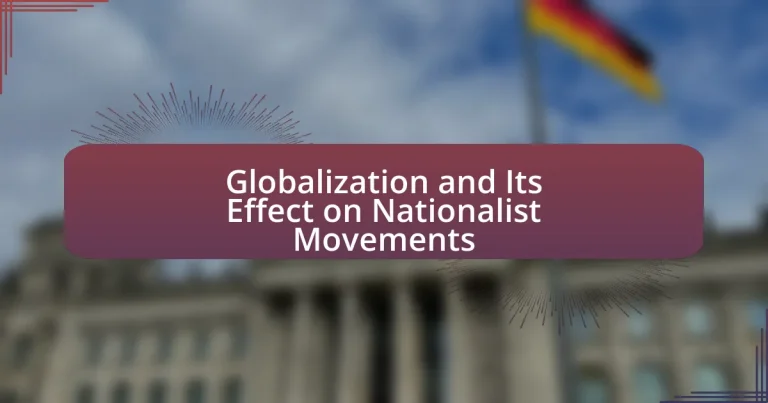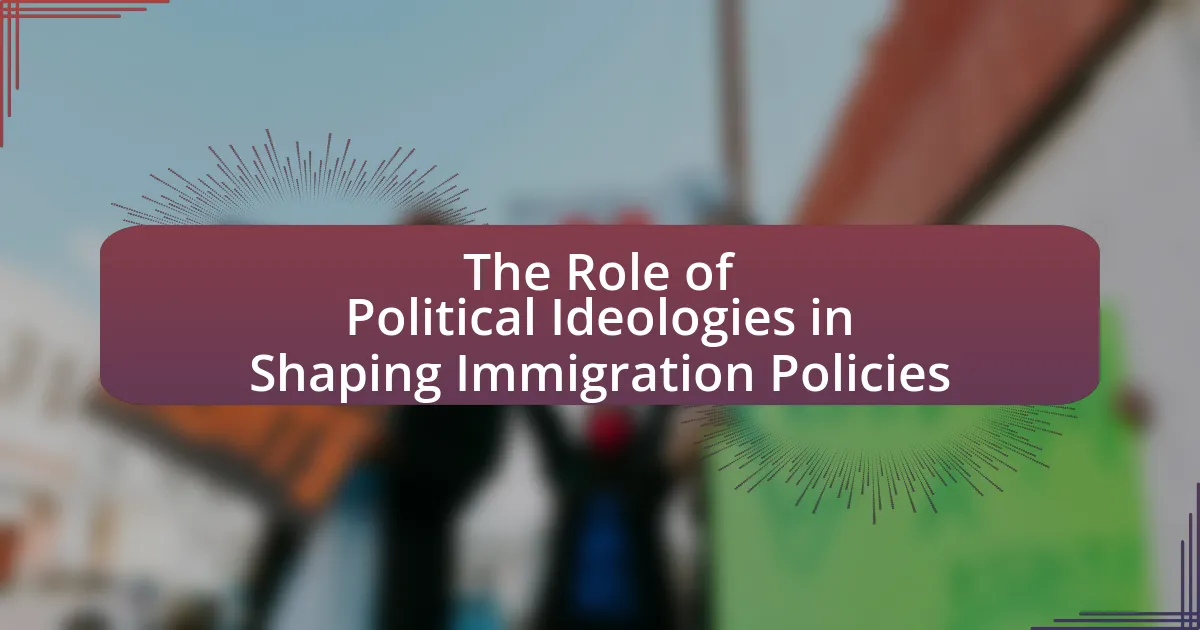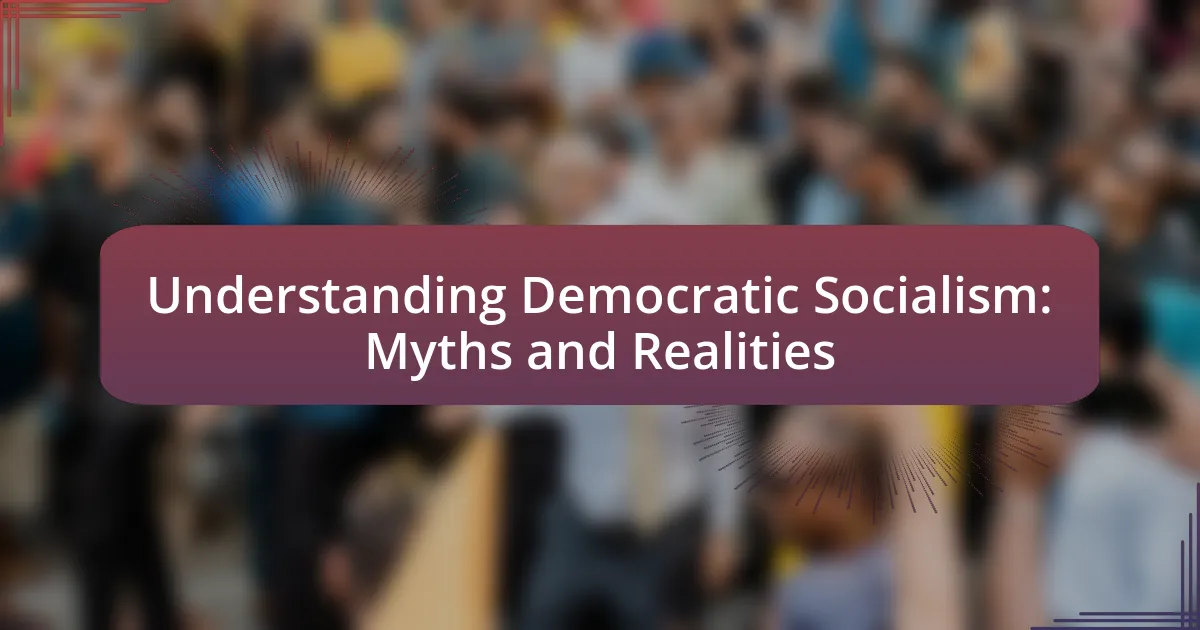Globalization refers to the increasing interconnectedness and interdependence among countries, driven by trade, investment, technology, and cultural exchange. This phenomenon significantly impacts nationalist movements, creating a complex relationship where globalization can both strengthen and weaken national identities. Key factors influencing this dynamic include economic interdependence, cultural exchange, and political integration, which can provoke nationalist sentiments as communities seek to preserve their unique identities. Historical examples, such as Brexit and the rise of populist movements in Europe and the United States, illustrate how globalization can lead to a resurgence of nationalism in response to perceived threats to cultural identity and economic sovereignty. The article explores the various types of nationalist movements, the role of technology, and the implications of globalization on regional identities, highlighting the dual nature of globalization’s effects on nationalism.
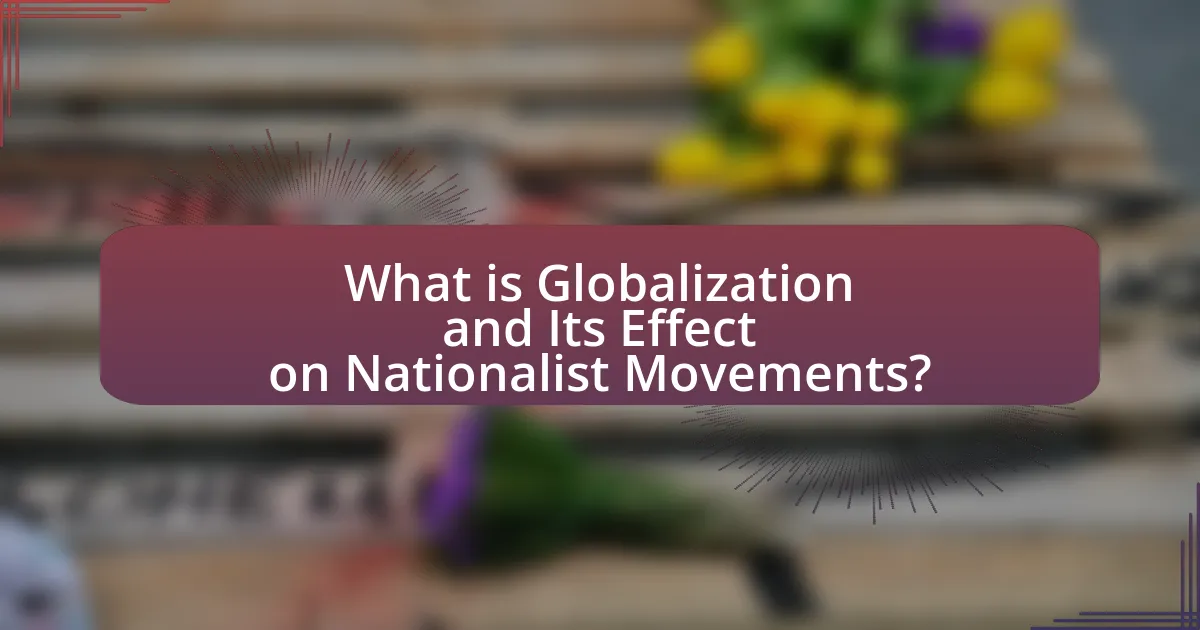
What is Globalization and Its Effect on Nationalist Movements?
Globalization is the process of increased interconnectedness and interdependence among countries, primarily driven by trade, investment, technology, and cultural exchange. This phenomenon has significant effects on nationalist movements, often leading to a paradox where globalization can both strengthen and weaken national identities. For instance, while globalization promotes economic integration and cultural exchange, it can also provoke a backlash as communities seek to preserve their unique identities and resist perceived external influences. Historical examples include the rise of nationalist sentiments in response to economic globalization in Europe, where movements like Brexit emerged as a reaction against the perceived loss of sovereignty and cultural identity. Thus, globalization influences nationalist movements by creating tensions between global integration and local identity preservation.
How does globalization influence national identity?
Globalization influences national identity by promoting cultural exchange and integration, which can lead to both the dilution and reinforcement of national identities. As countries become more interconnected through trade, technology, and communication, individuals are exposed to diverse cultures and ideas, often resulting in a blending of traditions. For instance, the rise of global media has introduced various cultural narratives that can challenge traditional national identities. Conversely, this exposure can also provoke a resurgence of nationalism as communities seek to preserve their unique cultural heritage in response to perceived threats from globalization. Research by the Pew Research Center indicates that in many countries, increased globalization correlates with a stronger emphasis on national identity as a reaction to cultural homogenization.
What are the key factors of globalization affecting nationalism?
The key factors of globalization affecting nationalism include economic interdependence, cultural exchange, and political integration. Economic interdependence arises from global trade and investment, which can dilute national sovereignty as countries become reliant on foreign markets and supply chains. Cultural exchange, facilitated by technology and communication, can lead to the blending of identities, challenging traditional national narratives. Political integration, through international organizations and treaties, often requires nations to cede some degree of autonomy, further complicating nationalist sentiments. These factors collectively contribute to a tension between global unity and national identity, as evidenced by the rise of populist movements in response to perceived threats from globalization.
How do cultural exchanges impact nationalist sentiments?
Cultural exchanges can both mitigate and exacerbate nationalist sentiments. On one hand, exposure to diverse cultures through exchanges can foster understanding and tolerance, reducing xenophobia and promoting a sense of global citizenship. For example, studies have shown that international student programs often lead to increased appreciation for multiculturalism, which can dilute extreme nationalist views. On the other hand, cultural exchanges can also provoke nationalist reactions, particularly when individuals perceive their cultural identity as threatened. Historical instances, such as the rise of nationalist movements in response to globalization in various countries, illustrate how cultural exchanges can lead to a backlash against perceived foreign influences. Thus, the impact of cultural exchanges on nationalist sentiments is complex and context-dependent, influenced by factors such as the existing political climate and societal attitudes towards diversity.
Why do nationalist movements arise in response to globalization?
Nationalist movements arise in response to globalization primarily due to perceived threats to cultural identity and economic sovereignty. As globalization fosters interconnectedness, many individuals and groups feel that their national identity is undermined by foreign influences, leading to a resurgence of nationalism as a means of preserving cultural heritage. For instance, the rise of populist parties in Europe and the United States has been linked to concerns over immigration and the loss of local jobs to global competition, which are often framed as threats to national integrity. Additionally, studies indicate that economic disparities exacerbated by globalization can fuel resentment, prompting communities to rally around nationalist ideologies to reclaim control over their economic futures. This dynamic is evident in various regions, where local populations mobilize to resist what they perceive as the negative impacts of global economic policies, reinforcing their national identity in the process.
What historical examples illustrate this phenomenon?
The rise of nationalist movements in response to globalization can be illustrated by the Brexit referendum in 2016. In this event, the United Kingdom voted to leave the European Union, driven by sentiments of national sovereignty and control over immigration, which were perceived to be undermined by EU policies. This decision reflected a broader trend where globalization led to a backlash against perceived threats to national identity and autonomy, as seen in various countries where similar movements emerged, such as the rise of the National Front in France and the Alternative for Germany party. These movements capitalized on fears that globalization diluted national culture and economic stability, demonstrating a clear historical example of how globalization can provoke nationalist sentiments.
How do economic factors contribute to nationalist movements?
Economic factors significantly contribute to nationalist movements by creating disparities in wealth and resources that fuel discontent among populations. When economic inequality arises, marginalized groups often feel excluded from the benefits of globalization, leading to a sense of grievance and a desire for self-determination. For instance, the rise of nationalist movements in regions like Catalonia and Scotland can be linked to economic frustrations over perceived unfair distribution of resources and political power. Additionally, economic crises, such as the 2008 financial downturn, have historically intensified nationalist sentiments as people seek to blame external forces for their hardships, thereby rallying around nationalist ideologies that promise to prioritize local interests and economic recovery.
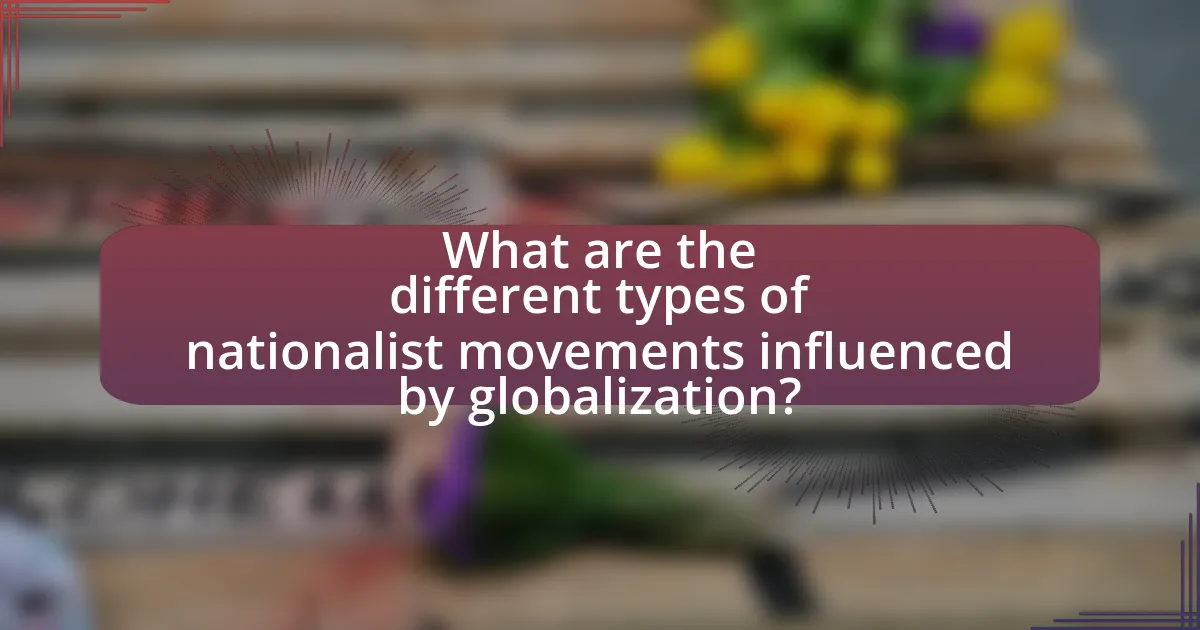
What are the different types of nationalist movements influenced by globalization?
Different types of nationalist movements influenced by globalization include ethnic nationalism, civic nationalism, and religious nationalism. Ethnic nationalism emphasizes shared heritage, culture, and language, often leading to movements that seek autonomy or independence, as seen in regions like Catalonia and Scotland. Civic nationalism focuses on shared citizenship and political values, promoting inclusivity while still asserting national identity, exemplified by movements in countries like Canada. Religious nationalism intertwines national identity with religious identity, often leading to movements that seek to establish a state aligned with specific religious principles, as observed in countries like India with Hindu nationalism. These movements are shaped by globalization through increased communication, migration, and the exchange of ideas, which can amplify local identities and grievances.
How do civic and ethnic nationalisms differ in the context of globalization?
Civic nationalism and ethnic nationalism differ primarily in their definitions of national identity, especially in the context of globalization. Civic nationalism is based on shared citizenship, legal equality, and political rights, emphasizing inclusivity regardless of ethnic background. In contrast, ethnic nationalism is rooted in shared heritage, culture, and ethnicity, often leading to exclusivity and a focus on preserving a specific cultural identity.
Globalization challenges civic nationalism by promoting multiculturalism and transnational connections, which can enhance inclusivity. For instance, countries like Canada exemplify civic nationalism by embracing diverse populations while maintaining a unified national identity. Conversely, globalization can exacerbate ethnic nationalism, as seen in movements that resist cultural dilution and seek to protect traditional identities, such as the rise of nationalist parties in Europe that advocate for ethnic homogeneity in response to immigration.
The distinction is evident in how these nationalisms respond to global influences: civic nationalism tends to adapt and integrate diverse cultures, while ethnic nationalism often reacts defensively, seeking to reinforce boundaries against perceived external threats.
What role does globalization play in the rise of ethnic nationalism?
Globalization significantly contributes to the rise of ethnic nationalism by facilitating the spread of cultural identities and economic disparities. As global interconnectedness increases, local communities often feel threatened by external influences, leading to a resurgence of ethnic pride and a desire to preserve cultural heritage. For instance, the rise of social media platforms allows ethnic groups to mobilize and articulate their grievances, as seen in movements like Catalonia’s push for independence from Spain. Additionally, economic globalization can exacerbate inequalities, prompting marginalized ethnic groups to rally around their identities in response to perceived threats from dominant cultures or economic systems. This dynamic illustrates how globalization can simultaneously connect and divide, fueling ethnic nationalism as groups seek to assert their distinctiveness in a rapidly changing world.
How does civic nationalism adapt to global influences?
Civic nationalism adapts to global influences by emphasizing inclusive citizenship and shared values over ethnic or cultural homogeneity. This adaptation allows civic nationalism to resonate with diverse populations and respond to global migration trends, as seen in countries like Canada and Australia, where policies promote multiculturalism while maintaining a national identity. The integration of global human rights norms and democratic principles further strengthens civic nationalism, enabling it to address transnational issues such as climate change and social justice, thereby reinforcing its relevance in a globalized context.
What are the implications of globalization on regional nationalist movements?
Globalization significantly influences regional nationalist movements by fostering both integration and resistance. As global interconnectedness increases, regional identities often emerge in response to perceived threats from homogenizing forces, such as cultural dilution and economic competition. For instance, the rise of nationalist movements in Catalonia and Scotland can be attributed to a desire for self-determination and preservation of local culture amidst the pressures of globalization. Additionally, economic disparities exacerbated by global trade can fuel nationalist sentiments, as seen in the rise of populist parties in various countries that advocate for local interests over global ones. These movements often gain traction by leveraging social media and global communication networks to mobilize support, illustrating how globalization can simultaneously empower and challenge regional identities.
How do regional identities respond to global pressures?
Regional identities often respond to global pressures by reinforcing their distinct cultural, social, and political characteristics. This reaction is evident in various movements where local communities emphasize their unique traditions and values as a counter to the homogenizing effects of globalization. For instance, the rise of regionalist parties in Europe, such as the Scottish National Party, showcases how regional identities mobilize in response to perceived threats from global economic policies and cultural influences. These movements often advocate for greater autonomy or independence, reflecting a desire to protect local heritage and governance against external forces.
What are the effects of supranational organizations on nationalism?
Supranational organizations often dilute nationalism by promoting collective governance and shared policies among member states. For instance, the European Union (EU) has established common regulations that supersede national laws, thereby reducing the autonomy of individual nations. This shift can lead to a sense of diminished national identity as citizens increasingly identify with broader regional or global communities. Additionally, supranational organizations can foster economic interdependence, which may weaken nationalist sentiments by creating incentives for cooperation over competition among nations. The rise of transnational issues, such as climate change and migration, further encourages collaboration that can overshadow traditional nationalist priorities.
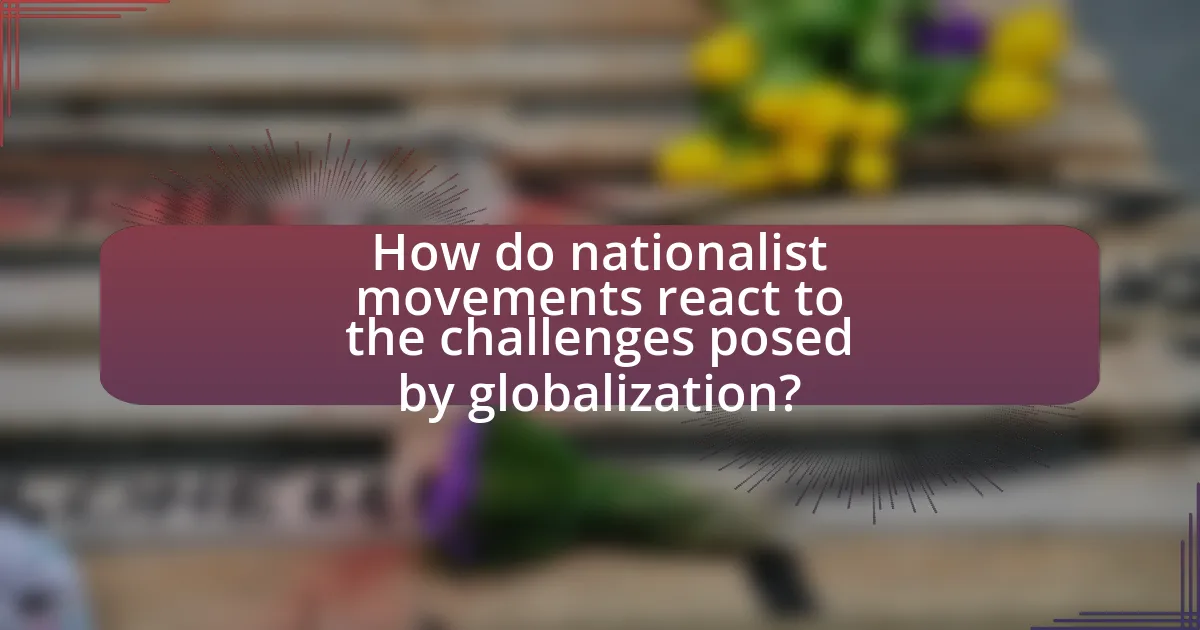
How do nationalist movements react to the challenges posed by globalization?
Nationalist movements typically react to the challenges posed by globalization by emphasizing national identity and sovereignty. These movements often advocate for policies that protect local industries and cultures from perceived threats of global economic integration. For instance, the rise of populist parties in various countries, such as the Brexit campaign in the United Kingdom, illustrates how nationalist sentiments can mobilize against globalization by promoting the idea of reclaiming control over national borders and economic policies. Additionally, research indicates that nationalist movements often gain traction during periods of economic uncertainty, as individuals seek stability and security in their national identity amidst global changes.
What strategies do nationalist movements employ to counter globalization?
Nationalist movements employ several strategies to counter globalization, including promoting local culture, advocating for economic protectionism, and emphasizing national sovereignty. By prioritizing local culture, these movements seek to preserve traditional values and identities that they perceive as threatened by global homogenization. Economic protectionism is often advocated through policies that restrict foreign competition, aiming to support domestic industries and jobs. Additionally, nationalist movements emphasize national sovereignty by resisting international agreements and organizations that they believe undermine their autonomy, as seen in the Brexit movement, where the UK sought to regain control over its laws and borders. These strategies reflect a broader resistance to perceived external influences that challenge national identity and economic stability.
How do these strategies vary across different countries?
Strategies related to nationalism in the context of globalization vary significantly across countries due to differing historical, cultural, and political contexts. For instance, in India, the strategy often involves promoting a Hindu nationalist agenda that emphasizes cultural heritage and identity, while in the United States, it may manifest as a focus on immigration control and economic protectionism to preserve American jobs. In contrast, European countries like Hungary adopt strategies that emphasize anti-immigration policies and the preservation of national sovereignty in response to the European Union’s influence. These variations are influenced by factors such as economic conditions, demographic changes, and the level of globalization experienced in each country, demonstrating that nationalism adapts to local contexts and challenges posed by global interconnectedness.
What role does technology play in these nationalist strategies?
Technology plays a crucial role in nationalist strategies by facilitating communication, mobilization, and the dissemination of nationalist narratives. Digital platforms enable nationalist movements to reach wider audiences, allowing for the rapid spread of ideologies and organizing efforts. For instance, social media has been instrumental in recent nationalist movements, such as the rise of populist parties in Europe and the United States, where platforms like Facebook and Twitter have been used to rally support and share propaganda. Additionally, technology aids in data collection and analysis, helping nationalist groups to identify and target specific demographics effectively, as seen in the use of data analytics during electoral campaigns. This integration of technology into nationalist strategies underscores its significance in shaping political landscapes in the context of globalization.
What are the potential outcomes of the interaction between globalization and nationalism?
The interaction between globalization and nationalism can lead to both the strengthening of nationalist movements and increased global cooperation. Nationalism may intensify as countries react to perceived threats from globalization, leading to policies that prioritize national interests over international collaboration. For example, the rise of populist leaders in various countries, such as Donald Trump in the United States and Marine Le Pen in France, illustrates how globalization can provoke a backlash that emphasizes national sovereignty and identity. Conversely, globalization can also foster a sense of interconnectedness that encourages nations to collaborate on global issues like climate change and trade, as seen in international agreements such as the Paris Agreement. This duality highlights that the outcomes of globalization and nationalism are not mutually exclusive but can coexist, influencing political landscapes worldwide.
How can globalization lead to both the strengthening and weakening of nationalist movements?
Globalization can lead to both the strengthening and weakening of nationalist movements by facilitating the spread of ideas and economic interdependence while simultaneously undermining local identities. On one hand, globalization promotes the exchange of cultural and political ideas, which can inspire nationalist movements to assert their identity and autonomy in response to perceived threats from global influences. For example, the rise of populist movements in various countries, such as Brexit in the United Kingdom, illustrates how globalization can galvanize national identity as a reaction against external pressures.
Conversely, globalization can weaken nationalist movements by fostering economic integration and cultural homogenization, which may dilute local traditions and identities. The increasing interconnectedness of economies can lead to a reliance on global markets, reducing the appeal of nationalist policies that prioritize local interests. For instance, the European Union’s economic framework has encouraged member states to adopt policies that align with broader European goals, often at the expense of national sovereignty.
Thus, globalization acts as a double-edged sword, simultaneously empowering nationalist sentiments while also challenging their foundations through economic and cultural convergence.
What future trends can be anticipated in the relationship between globalization and nationalism?
Future trends in the relationship between globalization and nationalism indicate a potential rise in nationalist sentiments as a reaction to global interconnectedness. As countries face economic disparities exacerbated by globalization, there is a likelihood of increased protectionist policies and a push for localism, which can manifest in political movements favoring national sovereignty over global cooperation. Historical patterns, such as the Brexit vote in 2016, illustrate how economic concerns and cultural identity can drive nationalist agendas in response to perceived threats from globalization. Additionally, the COVID-19 pandemic has further highlighted vulnerabilities in global supply chains, prompting nations to prioritize domestic production and self-sufficiency, reinforcing nationalist ideologies.
What practical steps can be taken to address the effects of globalization on nationalism?
To address the effects of globalization on nationalism, governments can implement policies that promote local culture and identity while fostering economic resilience. For instance, investing in education that emphasizes national history and cultural heritage can strengthen national identity amidst global influences. Additionally, supporting local businesses through subsidies and tax incentives can enhance economic independence, reducing reliance on global markets. Evidence shows that countries like Japan have successfully maintained strong national identities by prioritizing local industries and cultural education, which mitigates the impact of globalization on nationalism.
